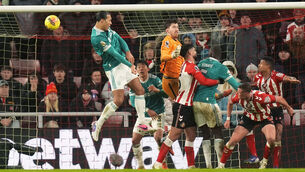Soccer can create the most unlikely of alliances
Sweden and Denmark are divided by a small stretch of sea and a lot of history, so inevitably they’re sworn enemies on the football pitch.
In the last European finals in Portugal they were in the same group, and found themselves face-to-face in the last match, with the chance of both countries going through at the expense of Italy, if they each got a point.
A very odd match ensued – “After you, Lars”, “No please, after you Henrik” – finishing with a Swedish equaliser in the 89th minute to make the score 2-2.
Even more blatant was the game between Germany and Austria in the 1982 World Cup, when Germany needed a win to qualify at the expense of Algeria.
Germans and Austrians may speak the same language, but when it comes to football it’s usually like England against Scotland.
Not on this occasion, however. Germany scored after 11 minutes and the remaining 80 minutes consisted of the ball being passed round midfield and back to the keeper, with not one serious shot on goal from either side.
“Shame on you!” screamed the front page of Das Bild, and the former German international Willi Schulz described the two teams as gangsters.
Nothing so disgraceful in the current tournament – so far anyway. But with both England and France facing possible elimination, there have been a fair few contortions.
England fans discovered a sudden love for the Star of David, and Steve McClaren no doubt spent Saturday night learning the Modeh Ani (the Jewish prayer that thanks God for returning the soul after the dangers of the night).
But that was nothing compared to the French, placed an anxious second in Group B and anticipating a nailbiting 90 minutes in Kiev tomorrow, unless Italy got a result.
“Forza Italia!” read the front page of L’Equipe on Saturday, with a giant picture of a smiling Italy’s Luca Toni.
As is well-known, for a Frenchman to use any language other than his own requires an emergency, and to speak Italian it has to be a matter of life and death. But just in case any readers didn’t get the message, the paper added in inch-high capitals: “Just for once we would be happy to see the Italians win”.
A draw in Glasgow would have left France needing to avoid defeat against the Ukrainians, so that last-minute goal Italian goal was a real bonus.
Jean-Pierre Escalattes, the president of the French football federation was sufficiently moved to phone his opposite number in Italy to offer his congratulations immediately after the final whistle.
It wasn’t easy for L’Equipe. Vincent Duluc, the paper’s football editor, confessed: “We’d been pondering that headline for 10 days. It was a way of declaring an armistice with our eternal rivals. Only temporarily: at the end of the game, Italy will once again be our number one opponent.”
It was all a bit too much for Raymond Domenech, the France coach who bears grudges like old soldiers bear medals.
Domenech still hasn’t come to terms with losing to Italy in an Under 21 qualifier back in 1999 (oddly enough it was 8 years ago to the day on Saturday) let alone in the World Cup last year. He still contends that the only reason France lost in Berlin was because of Marco Materazzi cynically failed to avoid Zinedine Zidane’s head — and he certainly wasn’t about to declare a truce, even for a day.
After encouraging his team not to watch the Italy game, advising them instead to “go to a disco or play cards”, he seemed almost to resent the fact that France had qualified without having to play.
“A team is also built through difficulties. Now the game in Ukraine has no value. If we’d come out on top in Kiev then I’d have celebrated.
“I had expected a draw,” added Domenech, before slipping the knife in. “But with the Italians I always forget about added time. However, I’m thankful that they continued to play till the end.”
“Les Bleus are grateful – but not Domenech” commented the Gazzetta dello Sport, before adding “Now all we need is for Zidane to apologise.”













